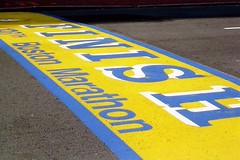 |
| Photo by Wally Gobetz and taken on April 10, 2004 in Back Bay, Boston, MA, US. |
When I got off my crutches, I expected to need additional training to get back to where I was prior to the broken ankle. What I did not expect was to be worse off than when I first started running. I have been pushing and pushing myself to get my pace up, but have realized my leg is not yet strong enough for that. It is very frustrating wanting to run and not be able to meet my own expectations. In the book I am reading, they warn of going into training with unreasonable expectations and personal agendas. As a first time marathon runner, my main goal is to finish the race. That in itself is a major accomplishment. Once I pass that milestone, then I can start tacking on additional goals, like achieving a certain time. Why add more pressure to myself? Why make this a chore instead of something I enjoy?
I decided to stop listening to my head and start listening to my body and the advice of experts on how to achieve my one and (now) only goal - to finish a marathon. A blog I read is Predawn Runner. The author has successfully complete many marathons and has a personable tone in his posts. I enjoy reading about his trials with training and races and knowing that it is not just me as a newbie.
This week he interviewed another first time marathon runner and what he said further strengthened my resolve to eliminate additional expectations. This runner not only wanted to complete a marathon, he also wanted to qualify for the Boston Marathon. After finishing the race, he was disappointed he did not have a qualifying time for Boston. Can you imagine, going through all that training only to be disappointed? That is the last thing I want to feel at the finish line. So out with the head trash.
There was also another point that I got from that interview. Hydrate! While running a marathon, there are water stations where volunteers hand you cups of water. Have you ever tried running and drinking a cup of water? Not easy. If you manage to get any in your mouth, you then have to worry about swallowing it without choking. How are you supposed to drink adequate amounts of water in those conditions? Well, I got my answer on another website that I like to frequent, Hal Higdon's Marathon Training Guide. Hal advises to take scheduled walking breaks.
Wait. What? I should actually plan on walking?
This is a completely foreign concept to me and it made me realize that I had yet another goal running through my head that I needed to get rid of. One of my motivating tricks I use while running is to tell myself that I can walk when I make it to the next light post, I can rest when I get to the top of the hill, I can slow down when I make it to the next intersection. I was making it a goal to run without stopping or walking, and here is an expert saying that "Walking is a perfectly acceptable strategy in trying to finish a marathon."
After I stopped to think about it, Mr. Higdon’s advice makes a lot of sense. He suggests not waiting until your body is so tired that you have to walk. The recovery time takes longer. If you plan when you are going to walk, you recover much faster and can continue longer. Another advantage is that you can plan your walks through water stations. This way you make sure you stay hydrated, and you give your body the recovery time. You can actually drink the water instead of wearing it or choking on it.
As logical as this sounds, I was not convinced of the benefit of scheduled walks until Mr. Higdon provided his personal experience. He once ran a 2:29 marathon while walking through every water station. This just proves my inexperience, and convinced me that it is okay to walk in a marathon.
So from now on, my only goal is to finish and to be proud of it!




